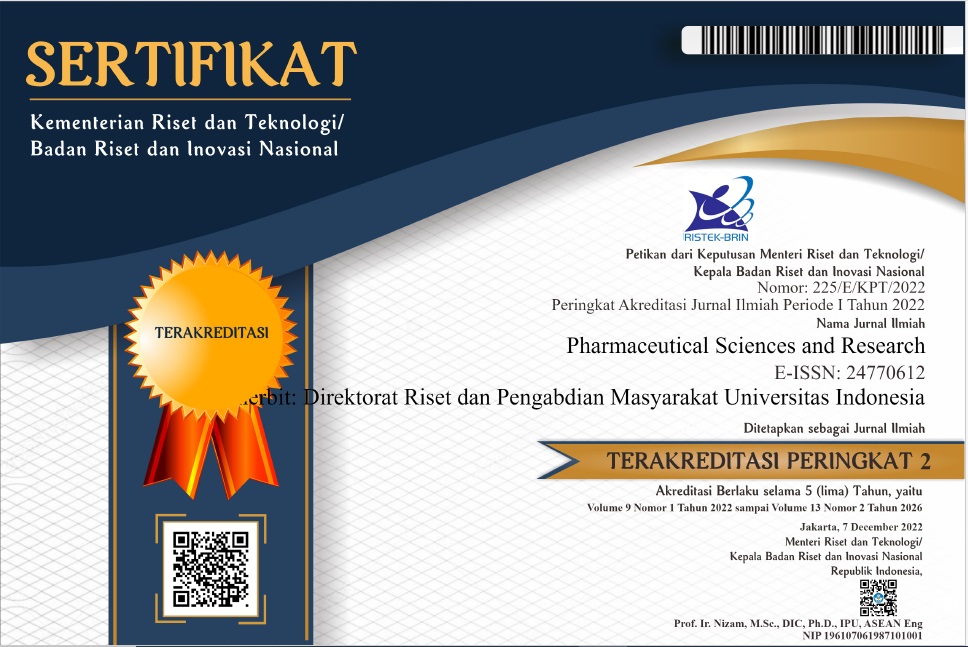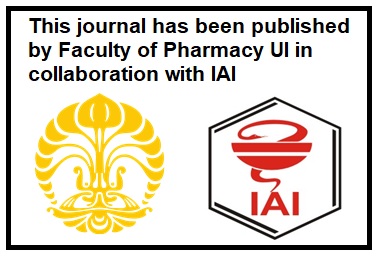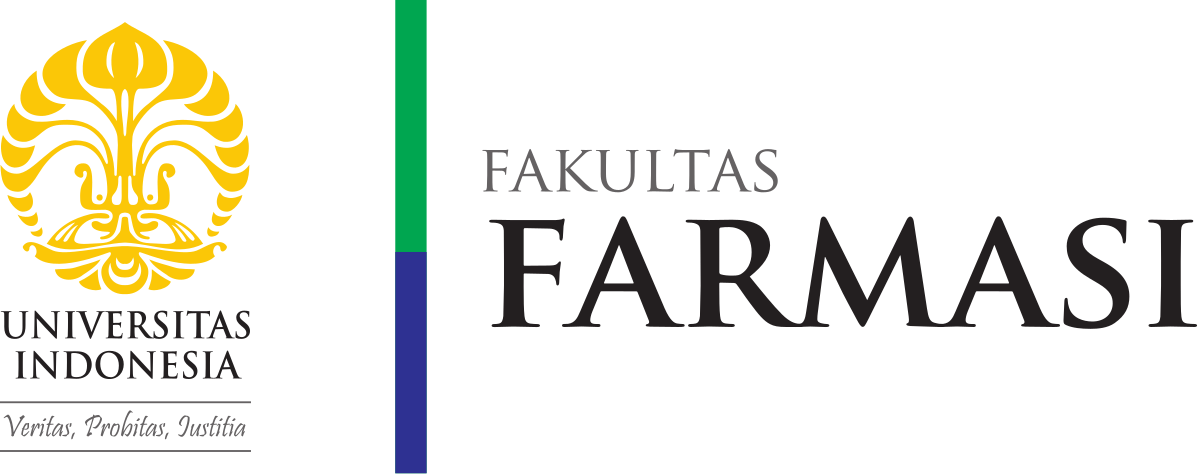Abstract
Voacanga foetida (Bl.) K.Schum leaves are known to have cytotoxic activity against blood cancer cells. This study was aimed to determine the potential of an isolated butanol fraction of Voacanga foetida (Bl.) K.Schum leaves (Tb3 compound) in inhibiting the proliferation of several cancer cells, including leukemia (K562), lung cancer (A549), and cervical cancer (He-La) using the dye exclusion method. We found that the percentage of anti-proliferation of the Tb3 compound was increased in a dose-dependent manner, where it showed 83% (K562), 72.3% (He-La), and 70.7% (A549) inhibition at higher concentration. These values were relatively higher compared to doxorubicin as a positive control, 77.1%, 63.8%, and 62.7%, respectively. Moreover, the IC50 values of the Tb3 compound were still in the range of active cytotoxic compounds based on NCI classification, which is less than 4 µg/mL; 0.5 μg/mL, 2.4 μg/mL, and 3.6 μg/mL for K562, A549, and He-La, respectively. Therefore, this study indicated the potential anticancer effect of an isolated butanol fraction of the Tb3 compound to inhibit cancer cell proliferation, which provides an alternative for cancer therapy.
References
Arbain, D. (2012). Inventory, constituents, and conservation of biologically important Sumatran plants. In Natural Product Communications. https://doi.org/10.1177/1934578x1200700627
Chen, H. M., Yang, Y. T., Li, H. X., Cao, Z. X., Dan, X. M., Mei, L., Guo, D. Le, Song, C. X., Dai, Y., Hu, J., & Deng, Y. (2016). Cytotoxic monoterpenoid indole alkaloids isolated from the barks of Voacanga Africana Staph. Natural Product Research. https://doi.org/10.1080/14786419.2015.1046132
Cui, Q., Yang, D. H., & Chen, Z. S. (2018). Special issue: Natural products: Anticancer and beyond. Molecules, 23(6), 11–14. https://doi.org/10.3390/molecules23061246
Denard, B., Lee, C., & Ye, J. (2012). Doxorubicin blocks the proliferation of cancer cells through proteolytic activation of CREB3L1. ELife, 2012(1), 1–14. https://doi.org/10.7554/eLife.00090
Dipiro, T.J., Talbert, L.R., Yee, C.G., Matzke, R.G., Wells, G.B., and Posey, M.L, (2011). Cancer Treatment And Chemotherapy, Pharmacotherapy A Pathophysiologic Approach 8th Edition.
Doyle, A., dan Griffiths (2000). J, Cell and Tissue Culture for Medical Research, John Willey and Sons Ltd, New York
Elmore, S. (2007). Apoptosis: A Review of Programmed Cell Death. Toxicologic Pathology, 35(4), 495–516. https://doi.org/10.1080/01926230701320337
Fink, S. L., & Cookson, B. T. (2005). Apoptosis, pyroptosis, and necrosis: Mechanistic description of dead and dying eukaryotic cells. Infection and Immunity, 73(4), 1907–1916. https://doi.org/10.1128/IAI.73.4.1907-1916.2005
Figueiredo, E. R., Vieira, I. J. C., De Souza, J. J., Braz-Filho, R., Mathias, L., Kanashiro, M. M., & Côrtes, F. H. (2010). Isolamento, identificação e avaliação da atividade antileucêmica de alcaloides indólicos monoterpênicos de Tabernaemontana salzmannii A. DC., Apocynaceae. Brazilian Journal of Pharmacognosy. https://doi.org/10.1590/S0102-695X2010000100016
Hadi, S., Desy Ratnasari, B., Septiyana, M., Priyambodo, S., & Sudarma, I. M. (2019). Antibacterial Assay and Alkaloid Lombine Distribution Study of Voacanga foetida (BI) Rolfe from Lombok Island. Oriental Journal of Chemistry. https://doi.org/10.13005/ojc/350133
Lee, C. C., & Houghton, P. (2005). Anti-proliferation of plants from Malaysia and Thailand used traditionally to treat cancer. Journal of Ethnopharmacology. https://doi.org/10.1016/j.jep.2005.01.064
Macabeo, A. P., Alejandro, G. J., Hallare, A., Vidar, W., & Villaflores, O. (2009). Phytochemical survey and pharmacological activities of the indole alkaloids in the genus voacanga thouars (apocynaceae) - An update. In Pharmacognosy Reviews.
Niu, G., & Chen, X. (2010). Apoptosis Imaging : Beyond Annexin V. Focus Moleculae Imaging, 51(11), 59–1663. https://doi.org/10.2967/jnumed.110.078584
Nurestri, S., Malek, A., Shin, S. K., Wahab, N. A., & Yaacob, H. (2009). Cytotoxic Components of Pereskia bleo (Kunth) DC. (Cactaceae) Leaves. HCT 116, 1713–1724. https://doi.org/10.3390/molecules14051713
Nurgali, K., Jagoe, R. T., & Abalo, R. (2018). Editorial: Adverse effects of cancer chemotherapy: Anything new to improve tolerance and reduce sequelae? Frontiers in Pharmacology, 9(MAR), 1–3. https://doi.org/10.3389/fphar.2018.00245
Riskesdas. (2013). Riset Kesehatan Dasar 2018. Kementrian Kesehatan Republik Indonesia. https://doi.org/1 Desember 2013
Siegel, R. L., Miller, K. D., & Jemal, A. (2019). Cancer statistics, 2019. CA: A Cancer Journal for Clinicians. https://doi.org/10.3322/caac.21551
Susanty, A., Dachriyanus, D., Yanwirasti, Y., Wahyuni, F. S., Fadhli, H., & Aswan, P. A. (2018). Aktivitas Sitotoksik Ekstrak Etil Asetat Daun Tampa Badak (Voacanga foetida (Bl.)K.Schum) pada Kanker Kolon HTB-38. JSFK (Jurnal Sains Farmasi & Klinis). https://doi.org/10.25077/JSFK.5.2.142-146.2018
Susanty, A., Fernando, A., & Adelin, I. (2014). Efek Analgetik Ekstrak Etanol Daun Tumbuhan Voacanga foetida (Bl.) K. Schum) pada Tikus Putih Jantan. Jurnal Sains Farmasi & Klinis. https://doi.org/10.25077/jsfk.1.1.1-9.2014
Taymaz-Nikerel, H., Karabekmez, M. E., Eraslan, S., & Kırdar, B. (2018). Doxorubicin induces an extensive transcriptional and metabolic rewiring in yeast cells. Scientific Reports, 8(1), 1–14. https://doi.org/10.1038/s41598-018-31939-9
Wong, R. S. Y. (2011). Apoptosis in cancer: From pathogenesis to treatment. Journal of Experimental and Clinical Cancer Research, 30(1), 1–14. https://doi.org/10.1186/1756-9966-30-87
Recommended Citation
Susanty, Adriani; Dachriyanus, Dachriyanus; Yanwirasti, Yanwirasti; Sri Wahyuni, Fatma; Sekar, Andisyah Putri; Alimin, Nur; Magdazaleni, Magdazaleni; Sofia, Sri Esky; and Dewi, Citra Kartika
(2020)
"The Anti-proliferation Effect of an Isolated Butanol Fraction of Tampa Badak (Voacanga foetida (Bl.) K. Schum) Leaves on Leukemia, Lung, and Cervical Cancer,"
Pharmaceutical Sciences and Research: Vol. 7:
No.
3, Article 8.
DOI: 10.7454/psr.v7i3.1196
Available at:
https://scholarhub.ui.ac.id/psr/vol7/iss3/8
Included in
Natural Products Chemistry and Pharmacognosy Commons, Other Pharmacy and Pharmaceutical Sciences Commons, Pharmaceutics and Drug Design Commons








